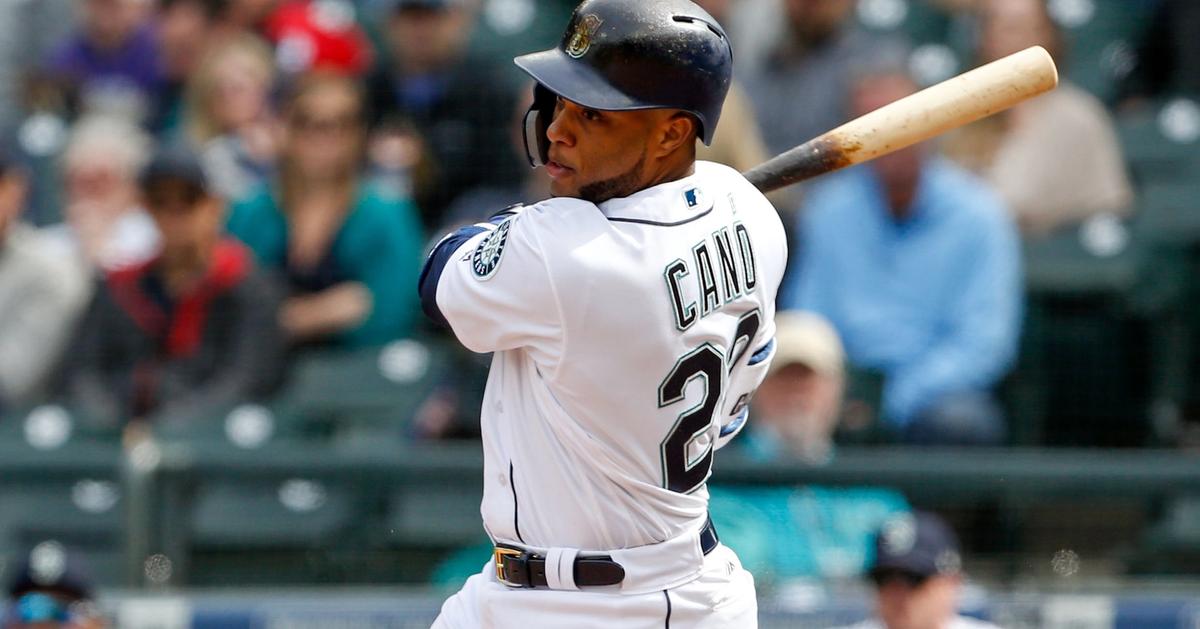(Photo Credit: REUTERS/JOE NICHOLSON)
If you were surprised by the accusations against Robinson Cano after he tested positive for a masking agent often used to cover up PED use, that's besides the point.
The greater affront to the reputation of baseball is MLB's refusal to approach the subject of substance users and cheaters with a heavy hand. If you think the players care about their reputation after being caught for PED use, just look at former New York Mets pitcher Jenrry Mejia, whose three suspensions have forced him out of baseball forever, or Marlon Byrd, whose second suspension in 2016 was for a full season.
This is MLB's curse of failing to be serious on a serious subject. The increased penalty, where first offenders are suspended 80 games, 162 games for a second offense, and a lifetime ban after a third time, seemed to be a step in the right direction. Three strikes and you're out, right? Well, players are now proving they're not afraid to bat with a strike or two against them.
Because players using PEDs aren't using them for the milestones of this amount of hits or that amount of home runs. The enrichment of these athletes via the lucrative contract has become the driving force behind player performances, doubly so when you consider many of these athletes rose from the mire of abject poverty to become the best at what they do.
Void the contract
If MLB wants to send a message about its seriousness on the subject, it needs to make a rule that would void contracts of players who are suspended for PED use. Wipe clean their slate. Confiscate their future monetary earnings and allow a team to reconstruct a contract with penalized parameters.
Consider Robinson Cano's case. At the time of his suspension, he was entering year five of a 10-year, $240m contract with a $50k bonus if he's elected to an All-Star team. As of his 13th season in the MLB, according to Spotrac, Cano has accumulated over $160m dollars between the Yankees and Seattle Mariners.
Cano will give up just over $10m dollars during his 80-game suspension. $14m will still be his to collect when he returns from the suspension, even though he will not be eligible to partake in the postseason should the Mariners qualify. His suspension doesn't affect the annual $24m per year from 2019 to 2023, at which point he will be 40 years old and ready to step away from the game.
Cano's name joins the likes of Ryan Braun, Alex Rodriguez, Manny Ramirez, Dee Gordon, and Melky Cabrera as a talented player whose career, which may have been on a Hall of Fame trajectory, is tainted by PED use. Only the team is penalized in these instances as they lose their best players, but these players have no issue receiving their payday after the fact.
Because Ryan Braun is amid a five-year, $105m contract after yielding $3m during his PED suspension in 2013. Rodriguez earned over $400m throughout his career even as he became the poster boy for PED use.
If teams keep paying players regardless of integrity, then players will keep testing the limits.
Final Thoughts
If MLB wants to ostracize the players caught cheating for performance enhancers, then it needs to become more serious about the consequences. Teams are still willing to pay these players big money even if it's the team itself who ends up getting hurt the most by these suspensions.
That's not to say every rumor should be treated with an immediate lifetime ban or voided contract. MLB has to be thorough with investigating allegations of PED use, as was the case when Baltimore Orioles first baseman Chris Davis tested positive for Adderall in 2014. But if the evidence is clear and undeniable, then the punishment should be of the utmost severity.
One of the biggest hurdles MLB will face is coming to an agreement with the Player's Association. The MLBPA, while keeping the best interests of its players at heart, will be at a crossroads with an updated drug policy. Some say performance enhancers aren't as common as they once were while others are saying they remain as prevalent as before.
Both parties will need to find common ground. Perhaps the MLBPA can counteract the penalty of voided contracts with an incentive for players to remain clean through additional bonuses and rewards. Maybe certain steroids, under the supervision of medical experts, can help aid in recovering from injuries while preventing any effects of performance enhancements. In that capacity, strictly monitored legalization can occur so that players can spend less time away from their jobs.
Where that common ground stands remains to be seen. Baseball has struggled with performance enhancers for the past 20 years. It's a complicated relationship where MLB struggles with making the penalty worth the consequence even if MLB wants to eradicate it from the sport. Instead, what we have is one of the most prolific war on drugs in sports that often leads to a complicated painting of relationship between players and leagues that could be described as contentious.
And this isn't an accusation of players like Braun, Cano, Nelson Cruz, or Rodriguez as bad people. Misguided, yes, but not inherently bad. But baseball needs clarity on the subject because right now an 80-game slap on the wrist isn't a strong enough consequence.
If MLB wants to maintain the integrity of the game, the consequences must be more severe.
Explore new topics and discover content that's right for you!
MLB The Show



